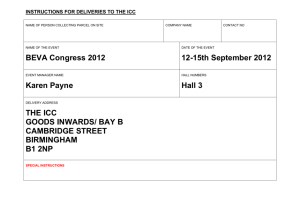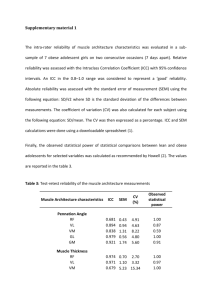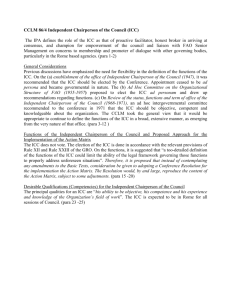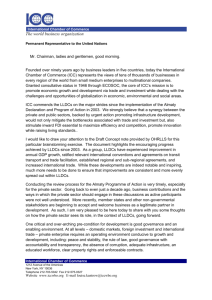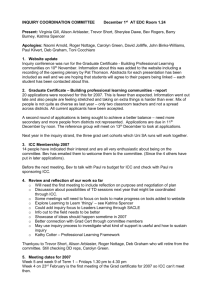MEDIA CONTACTS: In New York: Ms. Linda Gueye Head of
advertisement
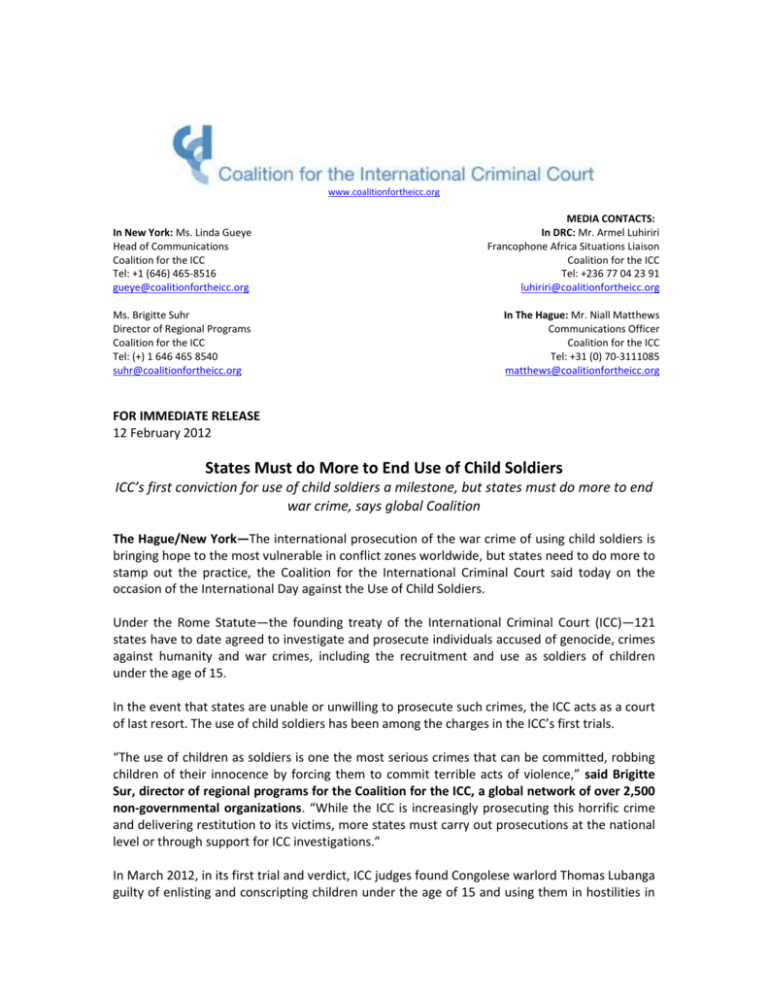
www.coalitionfortheicc.org In New York: Ms. Linda Gueye Head of Communications Coalition for the ICC Tel: +1 (646) 465-8516 gueye@coalitionfortheicc.org MEDIA CONTACTS: In DRC: Mr. Armel Luhiriri Francophone Africa Situations Liaison Coalition for the ICC Tel: +236 77 04 23 91 luhiriri@coalitionfortheicc.org Ms. Brigitte Suhr Director of Regional Programs Coalition for the ICC Tel: (+) 1 646 465 8540 suhr@coalitionfortheicc.org In The Hague: Mr. Niall Matthews Communications Officer Coalition for the ICC Tel: +31 (0) 70-3111085 matthews@coalitionfortheicc.org FOR IMMEDIATE RELEASE 12 February 2012 States Must do More to End Use of Child Soldiers ICC’s first conviction for use of child soldiers a milestone, but states must do more to end war crime, says global Coalition The Hague/New York—The international prosecution of the war crime of using child soldiers is bringing hope to the most vulnerable in conflict zones worldwide, but states need to do more to stamp out the practice, the Coalition for the International Criminal Court said today on the occasion of the International Day against the Use of Child Soldiers. Under the Rome Statute—the founding treaty of the International Criminal Court (ICC)—121 states have to date agreed to investigate and prosecute individuals accused of genocide, crimes against humanity and war crimes, including the recruitment and use as soldiers of children under the age of 15. In the event that states are unable or unwilling to prosecute such crimes, the ICC acts as a court of last resort. The use of child soldiers has been among the charges in the ICC’s first trials. “The use of children as soldiers is one the most serious crimes that can be committed, robbing children of their innocence by forcing them to commit terrible acts of violence,” said Brigitte Sur, director of regional programs for the Coalition for the ICC, a global network of over 2,500 non-governmental organizations. “While the ICC is increasingly prosecuting this horrific crime and delivering restitution to its victims, more states must carry out prosecutions at the national level or through support for ICC investigations.” In March 2012, in its first trial and verdict, ICC judges found Congolese warlord Thomas Lubanga guilty of enlisting and conscripting children under the age of 15 and using them in hostilities in the Democratic Republic of Congo (DRC) in 2002-03. He was later sentenced to 14 years of imprisonment. "Child soldiers continue to be a major problem of domestic policies of many countries affected by armed conflict, such as Mali, the Central African Republic or the Democratic Republic of Congo,” said Bukeni Beck Wazuri, program manager for Africa and the Middle East at WITNESS. “The ICC trial of Thomas Lubanga has certainly provided a glimmer of hope in the fight against impunity for this crime, but primary responsibility lies with national jurisdictions." A verdict in the ICC trial of Germain Katanga, another Congolese rebel leader charged with using child soldiers—among other crimes—is expected later this year. Similar charges have been lodged against ICC fugitives Bosco Ntganda and Joseph Kony along with his Lords Resistance Army cohorts. In April last year, the use of child soldiers was among the war crimes for which former Liberian president Charles Taylor was found guilty by the Special Court for Sierra Leone. He received a 50-year sentence. The Lubanga conviction brought the ICC’s unique reparations mandate into play for the first time. It is expected that any eventual awards will contribute to the reintegration into society of the former child soldiers involved in the case, 10 of whom testified during the proceedings. Children reportedly continue to be forced into fighting—in Uganda, Mali, the Central African Republic, Syria and Colombia for example. “Colombia lags behind in the investigation and prosecution of those responsible for conscripting or enlisting children for use in armed conflict,” said Hilda Molano, coordinator of the Coalition against the Involvement of Children and Youth in the Armed Conflict in Colombia (COALICO). “Despite the demobilization of over 5000 children, there have been only two convictions under the Peace and Justice law, and 13 in ordinary courts, with none of these addressing sexual violence,” Molano added. “We call on the government to increase the prosecution of those responsible for this atrocious crime.” “In northern Mali, armed groups have used child soldiers to maintain and expand their control over territory,” said Solidarité Internationale pour un Développement Endogène (SIDE), a member of the Malian Coalition for the ICC. “We urge an end to the recruitment of child soldiers and denounce the perpetrators of this crime, a violation of children’s rights.” On this International Day against the Use of Child Soldiers, governments around the world must pledge to take concrete steps to prevent this war crime and ensure children that are used as soldiers have access to justice, rehabilitation and reparation. Background: The International Day against the Use of Child Soldiers marks the entry into force of the Optional Protocol to the Convention on the Rights of the Child on the Involvement of Children in Armed Conflict on 12 February 2002. More than 140 states have ratified the Protocol, agreeing to assume responsibility for the prohibition of the recruitment of children under 18 into armed groups and government forces and their direct participation in hostilities. On 3 October 2012, Thomas Lubanga appealed his guilty verdict and sentence. The ICC prosecutor appealed for the sentence to be revised upwards. A decision is pending. The ICC is the world's first permanent international court to prosecute war crimes, crimes against humanity, and genocide. Central to the Court's mandate is the principle of complementarity, which holds that the Court will only intervene if national legal systems are unwilling or unable to investigate and prosecute perpetrators of genocide, crimes against humanity and war crimes. There are currently eight investigations before the Court: the Central African Republic; Cote d’Ivoire; the Democratic Republic of the Congo; Darfur, the Sudan; Uganda; Kenya; Libya; and Mali. The ICC has publicly issued 22 arrest warrants and nine summonses to appear. The Court issued a judgment in its first trial on 14 March 2012. Two other trials are ongoing. The ICC Office of the Prosecutor has also made public that it is conducting seven preliminary examinations on four continents: Afghanistan, Colombia, Georgia, Guinea, Honduras, Republic of Korea and Nigeria. The Coalition for the International Criminal Court is a global network of civil society organizations in 150 countries working in partnership to strengthen international cooperation with the ICC; ensure that the Court is fair, effective and independent; make justice both visible and universal; and advance stronger national laws that deliver justice to victims of war crimes, crimes against humanity and genocide. coalitionfortheicc.org Experts from DRC human rights organizations and international NGOs are available for background information and comment. List of experts available upon request to: communications@coalitionfortheicc.org ###
